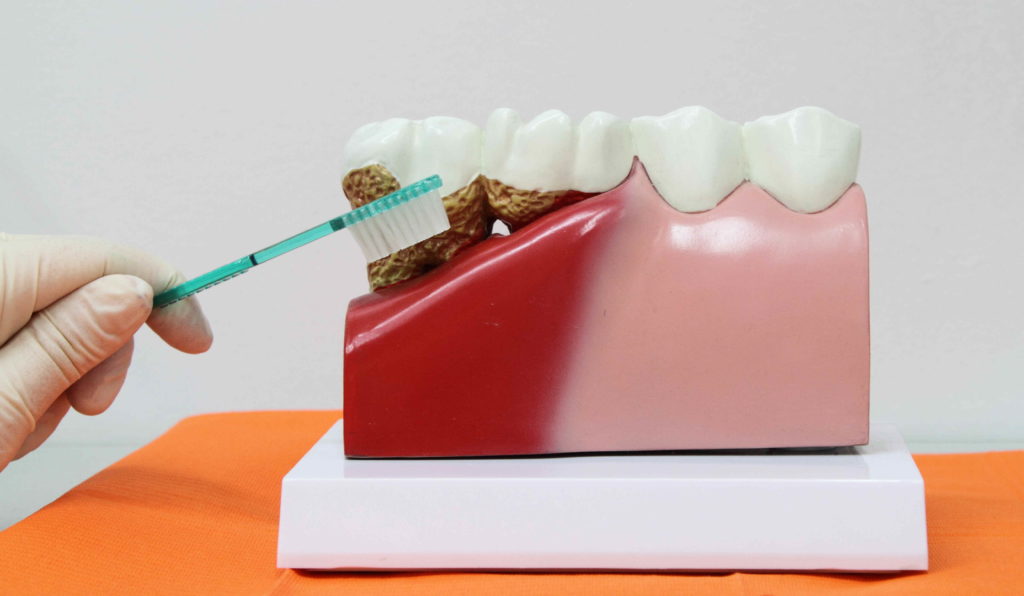Your dentist and hygienist advise you to maintain good oral hygiene to keep your whole mouth healthy. Good oral habits also help prevent the onset of periodontal disease. These oral pathologies can have a direct impact on the development of systemic diseases that can seriously affect your overall health. How can you prevent periodontal disease? What treatments are available? Helvident takes stock.
Periodontal disease: definition
Periodontal disease affects the periodontium, the tissues that support the teeth. This includes the bone and gums, but also the ligament surrounding the roots and the cementum covering them. These diseases manifest themselves as pain, inflammation or infection of the dental tissues. There are two main types of periodontal disease.
Gingivitis
This is the medical term for gum inflammation. The gums become very red and swollen, and often start to bleed when teeth brushing.
Periodontitis
In most cases, untreated gingivitis leads to periodontitis. Different types of periodontitis attack the tissues that support the teeth. Over time, the bone that holds teeth in place in the jaw destroys. Teeth become mobile. Left untreated, periodontitis can lead to tooth loss.
Causes of periodontal disease
The main culprit in periodontal disease is plaque. Plaque is a film of bacteria that forms on the surface of teeth every day. While many plaque bacteria are completely harmless, some are the cause of periodontal disease. To prevent and treat periodontal disease, you need to meticulously remove plaque from your teeth every day.
How can we take preventive action?
Fortunately, there are steps you can take to limit the risk of developing periodontal disease:
- Brush your teeth after every meal and at night before going to bed;
- At least once a day and before brushing, take the time to floss or use brushes to clean the spaces between teeth;
- Eat a balanced diet with as little sugar and acid as possible;
- Stop smoking, because smoking has a direct effect on the proliferation of bacteria in the mouth;
- See your dentist regularly for a professional cleaning and a thorough oral examination.
Diagnosis
The first symptom is blood on your toothbrush or in the rinse water when you brush your teeth. Your gums may also bleed when you eat, leaving a bad taste in your mouth. You may also have bad breath.
The first thing to do is consult your dentist, who will perform a complete examination of your teeth and gums. He or she will measure the depth of gum tissue around each tooth to detect any signs of incipient periodontitis. X-rays are also a great help in revealing bone loss. This assessment is very important, as it enables treatment to be tailored to your individual case.
Treating periodontal disease
Your dentist will remove plaque and tartar deposits from your teeth. He or she will also show you how to remove plaque at home, by thoroughly cleaning all surfaces of your teeth. Several appointments with your dentist may be necessary. Good oral hygiene habits, including brushing and interdental cleaning, are essential to prevent periodontal disease from worsening.
Periodontitis is never completely cured. However, it can be controlled if you adopt good oral hygiene habits. Indeed, only proper dental hygiene can ensure healthy periodontium. Bone loss is very slow and may even stop progressing. Nevertheless, you need to remove plaque every day and consult your dentist regularly.
The link between periodontal disease and certain systemic illnesses
Periodontal disease leads to a proliferation of bacteria in the periodontium. By degrading the periodontium, the bacteria produce toxins that can reach other parts of the body through the bloodstream. This is why periodontitis can have a direct effect on certain organs, and is increasingly associated with serious health problems.
In recent years, periodontal disease has been found to be linked to general health problems such as diabetes, stroke, heart and lung disease, pregnancy problems and even dementia. Further research is needed to understand such links. However, a growing body of evidence suggests that a healthy mouth and gums help to improve overall health and reduce the cost of medical treatment.
At Helvident, our team includes dental hygienists, dentists and specialists to treat all types of oral pathologies. Don't hesitate to make an appointment at our dental centers and clinics in Fribourg, Lausanne and Aigle.

